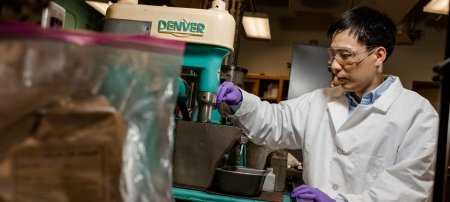Michigan Technological University’s bachelor’s degree program in mining engineering has been accredited by the Engineering Accreditation Commission of ABET, the global accreditor of college and university programs in applied and natural science, computing, engineering and engineering technology.
ABET accreditation assures that programs meet standards to produce graduates ready to enter critical technical fields that are leading the way in innovation and emerging technologies, and anticipating the welfare and safety needs of the public.
Michigan Tech’s mining engineering program is one of only 13 such degree programs across the nation to earn ABET accreditation. In total, 13 different ABET-accredited degree programs are now offered by the College of Engineering at Michigan Tech.
“ABET accreditation is a significant achievement,” said Aleksey Smirnov, chair of the Department of Geological and Mining Engineering and Sciences (GMES). “We have worked hard to ensure that our program meets the quality standards set by the profession. And, because it requires comprehensive, periodic evaluations, ABET accreditation demonstrates our continuing commitment to the quality of our program — both now and in the future.”
“This is a recognition by ABET that our students and the program meet the accreditation standards,” said Leonard Bohmann, Michigan Tech’s associate dean of academic affairs in the College of Engineering. “It signals to students that when they come here they will receive a strong education in mining engineering that has been rigorously reviewed. It informs employers that they can be confident that our students have an outstanding education in mining engineering. And, with an ABET accredited degree, students can become licensed professional engineers.”
“This success came through the dedicated and indefatigable efforts by Professor John Gierke, who served as department chair from 2014 to 2020, and our superb mining engineering faculty, Associate Professor Snehamoy Chatterjee and Senior Lecturer Nathan Manser,” added Smirnov. “Outstanding clerical support was provided by department staff Brittany Buschell and Carol Asiala.”
The pandemic created additional challenges during the accreditation process, but also opportunities, noted Gierke. “The responses to the onset of the pandemic in 2020 disrupted the installation of mine ventilation lab equipment. In addition, videos and video calling were required for the facilities tours as part of the virtual site visit. The need to thoroughly review the facilities was extra challenging in the virtual format.”
Despite the fact that their final few months had to be conducted remotely, the adaptability of the students during their mining engineering senior capstone project — along with their advisor, Nathan Manser — allowed that project to conclude on several high notes. “The senior students quickly learned how to use mine design software remotely, how to meet on Zoom and collaborate online,” Gierke said. “They probably didn't realize it at the time, but with their increased use of remote collaborations in professional work, the students all got some accelerated practice.”
Michigan Tech’s degree program in mining engineering was reinstated in 2019 after a 15-year hiatus. In order to apply for accreditation, however, GMES had to wait until at least one student graduated with the degree. “We graduated our first three students in the spring of 2020,” said Smirnov.
“The University is proud to see mining returning as an ABET-accredited program,” said Jacqueline Huntoon, provost and senior vice president for academic affairs. “Michigan Tech was initially founded to support the mining industry and it is exciting to see us reaffirm our commitment to excellence for this segment of industry.”
Sought worldwide, ABET’s voluntary peer review process is highly respected because it adds critical value to academic programs in the technical disciplines, where quality, precision and safety are of the utmost importance.
Developed by technical professionals from ABET’s member societies, ABET criteria focus on what students experience and learn. ABET accreditation reviews look at program curricula, faculty, facilities and institutional support, and are conducted by teams of highly skilled professionals from industry, academia and government, with expertise in the ABET disciplines.
ABET is a nonprofit, nongovernmental organization with ISO 9001:2015 certification. It currently accredits 4,307 programs at 846 colleges and universities in 41 countries and areas.
Michigan Technological University is an R1 public research university founded in 1885 in Houghton, and is home to nearly 7,500 students from more than 60 countries around the world. Consistently ranked among the best universities in the country for return on investment, Michigan's flagship technological university offers more than 185 undergraduate and graduate degree programs in science and technology, engineering, computing, forestry, business, health professions, humanities, mathematics, social sciences, and the arts. The rural campus is situated just miles from Lake Superior in Michigan's Upper Peninsula, offering year-round opportunities for outdoor adventure.






Comments